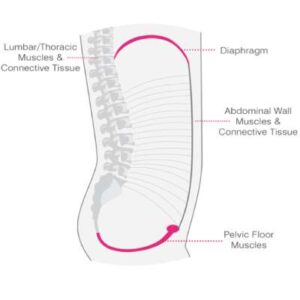How Breathing Impacts Your Pelvic Floor
By Jeanette Brown
Core/Pelvic Floor Specialist
If you suffer from bladder urgency, leaking or pelvic organ prolapse, you can immediately implement some simple, time-saving strategies to help your pelvic floor.
As women, large companies target us into believing that it’s normal for our bladders to leak and provide us with the solution of purchasing their absorbent pads and underwear. These are not a solution to the root cause of the problem.
I became interested in pelvic floor work after having three children. When I was three years postpartum from my third child. I was in my late thirties, and I was just starting to feel more like my old self when, out of the blue, I suddenly felt a warm gush when I jumped out of my chair suddenly (my football team had scored a goal). I felt ashamed and embarrassed, and I didn’t share it.
I needed to find a solution that didn’t involve surgery, devices, pads and pills. I knew there must be something that I could do at my stage of life to improve uncontrollable bladder leaks.
With my profession in Post Rehab Pilates, I stumbled across the Hypopressive method.
During my training in this method and my knowledge and experience with the body, it was brought to my attention that how you breathe has a direct effect not only on your pelvic floor but on your nervous system, core stability, mobility in your upper back and tension in your neck and shoulders.

How to Breathe
Why am I being taught how to breathe?
That’s the way I used to think too! When I used to be a participant, I would roll my eyes if I was in a class, and the instructor would talk about breathing!
How hard can it be? We do it all the time without giving it a second thought. We don’t need instruction on THAT! I previously believed our body parts were separate from one another. If I had a pain in my foot, it was a foot problem. If I had a pain between my shoulder blades, that’s precisely where the problem was.
Fast forward 20 years: I now realize our breath’s impact on our cores and pelvic floors. The pain in your foot could be a result of tension in your pelvic floor which may also contribute to tight neck pain, etc.
If you don’t breathe well, you won’t develop good core skills. The more you use your diaphragm (your most significant breathing muscle) for breathing, the more your pelvic floor reacts.
Proper breathing techniques are the first step in restoring the optimal function of the pelvic floor. I’m referring to using your nose to breathe in and not your mouth. It may seem challenging, but it will improve over time.
Your diaphragm and pelvic floor react together. When you inhale, your diaphragm flattens, and your pelvic floor muscles lengthen. When you exhale, your diaphragm domes and pelvic floor contracts.
If you’re not getting a great inhale, you’re not getting optimal movement in your pelvic floor.
When you use your nose, you can deepen your inhale, which gives you access to your diaphragm. We want to encourage movement into the back and side ribcage rather than the front only.

First Steps
Before practicing your breathing, you need to move the body first to release tension and restrictions.
It will be impossible for you to breathe well if you have spent hours sitting at a desk or standing still in one spot. You need to move your body first to release fascial tension around the ribcage, diaphragm, neck and shoulders.
Once you have warmed up for five minutes, you may start to practice your breathing techniques to better utilize your diaphragm.
Simple Tips
- When you go to the toilet, you need to relax
- Focus on the moment and let the urine pass out of you without actively pushing
- There is no need to drive or bear down when you empty your bladder
- Be patient and let it naturally happen instead of pushing down because you’re in a rush
- It is normal to urinate every 2-4 hours
- If you wait too long to urinate, you’ll be in danger of overstretching your bladder
- Leads to weakening of the bladder and its ability to contract and empty, which leaves you with residual urine and that feeling of not being completely relieved
- Avoid stopping your flow of urine midstream–it is not a sign of a strong pelvic floor
- If you suffer from bladder urgency and leaking, try limiting your caffeine and alcohol, which are both irritants to your bladder
- Look after any constipation issues by eating a fibre-rich diet, drinking plenty of water and exercising to keep all of your systems moving
- A backed-up rectum can put extra pressure on your bladder, giving you a false sense of urgency
Get your your free copy of my resource Breathing and Your Pelvic Floor
Book here for your free 30-minute assessment to see if you’re a good candidate for the 12-Week Core Restore Program

